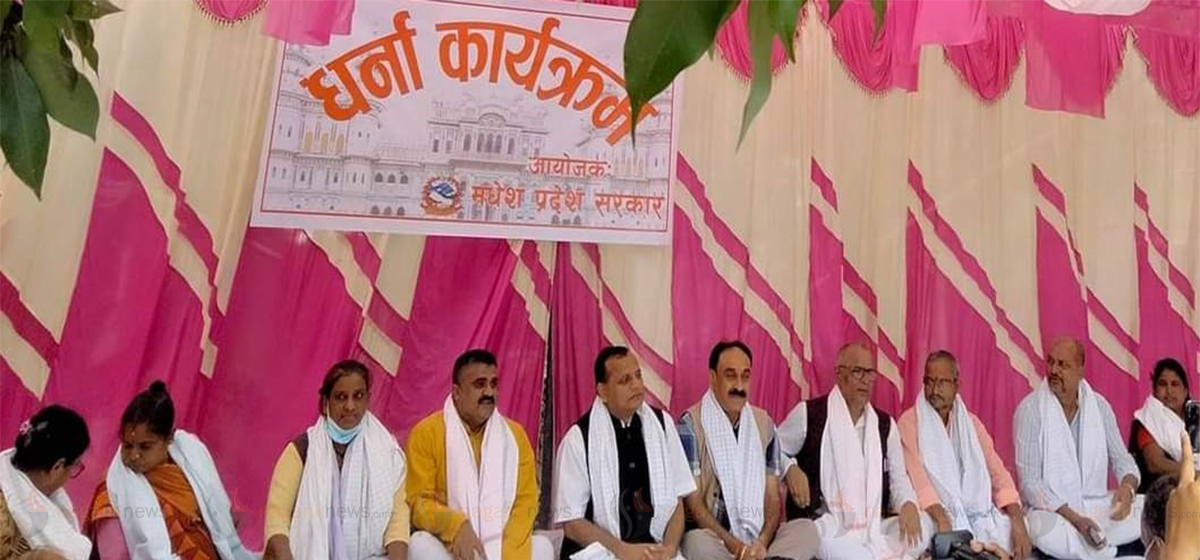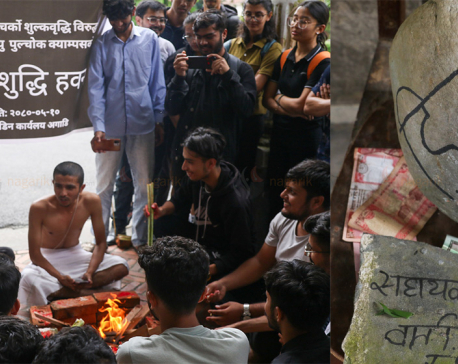
OR
Madhesh CM and ministers stage sit-in at office of province chief
Published On: August 15, 2022 02:00 PM NPT By: Mithilesh Yadav

Police adjustment becoming complicated
JANAKPURDHAM, August 15: Madhesh Chief Minister (CM) Lal Babu Raut and the ministers in his Cabinet staged a sit-in in front of the office of the Province Chief on Sunday, demanding immediate adjustment of the police at the provincial government. The CM and ministers staged the sit-in at the office of the provincial head. In the first phase, a sit-in will be held for two hours every day for a week under the leadership of the Chief Minister. If the federal government does not proceed with the process to address the demand even within a week, then the next phase of agitation will be started, said the spokesperson for the Madhesh province government, Home and Communications Minister Bharat Shah.
Chief Minister Raut said that he started the movement for the successful implementation of federalism. According to him, the successful implementation of federalism will not happen until the provincial government is given various powers, including the police, according to the constitution. "In schedule 6 of the constitution, the provincial government has been given the responsibility of peace and security. Is peace and security possible in the province without police administration?" Raut asked, adding, "Police adjustment preparations are in full swing. It should be adjusted immediately and given under the province.” Chief Minister Raut claimed that he was not protesting for cheap popularity and said that he was asking for the rights given by the constitution. He said, "We are trying to take the rights given by the constitution. We want to successfully implement federalism.”
He said that despite repeatedly asking the federal government to adjust the police force, it has not been serious. He said, "We have started a struggle against the federal government because the adjustment process was not started even in the one week time that we gave last time." With the opening of the provincial chief's office, Chief Minister Raut, Home and Communications Minister Bharat Prasad Shah, Energy and Drinking Water Minister Om Prakash Sharma, Physical Infrastructure Development Minister Ram Saroj Yadav, Law Minister Pramod Yadav, State Minister for Home and Communications Ruby Karna and members of the Provincial Assembly staged the sit-in.
As provincial police is provided for in Article 268 of the constitution and the rights related to peace and security are placed in the list of jurisdiction of the provincial governments in schedule 6, serial number 1 of the constitution, the provincial government demands that the police force be adjusted before the election to the House of Representatives.
Minister of Home Affairs and Communications of the Provincial Government, Shah said that the Police Personnel Adjustment Act, 2076 and the Nepal Police and Provincial Police Operation, Supervision and Coordination Act, 2076 were approved by the President on 11th February 2020, so they should be enacted as soon as possible.
It has been two and a half years since the Act, 2076 came into existence to regulate the operation, supervision and coordination of the work performed by Nepal Police and Province Police. But the struggle between the province and the federal government regarding implementation in practice is still ongoing. The constitution has clearly given the province the right to police administration and peace and security within the province. In the first point of the list of single rights of the province in Schedule 6 of the Constitution, it is mentioned that the right of "provincial police administration and peace and security" belongs to the province. In accordance with the provisions of the Constitution, the Act on Supervision and Coordination of the Operations of Nepal Police and Provincial Police made by the Federal Parliament has assigned the right to maintain peace and security and public order within the province.
The provisions of the Act seem to support dual and parallel power in the province. In the Act, it is said that the police personnel up to the Deputy Superintendent of Police (DSP) will be adjusted in the provincial police. It is said that the central (union) government will depute the police personnel of the rank above that. Similarly, it is said that the Chief District Officer (CDO) who is posted in various districts will also be posted as a representative of the center. It is mentioned in the Act that the Province Police Chief and the Deputy Inspector General of Police (DIG) will be appointed by the center. Due to these provisions, the chain of command of the police is in danger of collapsing. After the central government became decisive regarding giving instructions to the administrative or police officers working in the country, regarding their professional development, incentives-punishment etc., the question has been raised as to how the instructions of the provincial security apparatus can be final and effective.
You May Like This

Madhesh govt protesting against federal govt over delay in police adjustment
JANAKPURDHAM, August 14: The Madhesh provincial government has organized a sit-in protest against the federal government as their demand for... Read More...

Pulchowk Campus students protest against fee hike by performing Hawan (In Photos)
KATHMANDU, Aug 27: Students of the Pulchowk Engineering Campus have taken a unique approach to protest against engineering fee hike... Read More...

Pokhara ward chairs end protest after mayor’s assurances
POKHARA, June 29: Agitating ward chairs in Pokhara Metropolitan City have withdrawn their protest from Friday after the mayor of... Read More...









Just In
- Heavy rainfall likely in Bagmati and Sudurpaschim provinces
- Bangladesh protest leaders taken from hospital by police
- Challenges Confronting the New Coalition
- NRB introduces cautiously flexible measures to address ongoing slowdown in various economic sectors
- Forced Covid-19 cremations: is it too late for redemption?
- NRB to provide collateral-free loans to foreign employment seekers
- NEB to publish Grade 12 results next week
- Body handover begins; Relatives remain dissatisfied with insurance, compensation amount








Leave A Comment